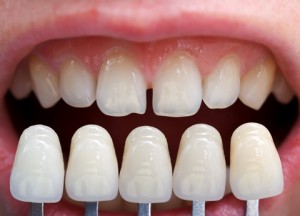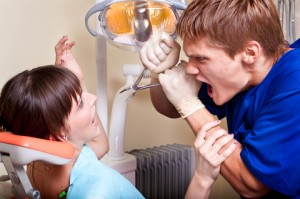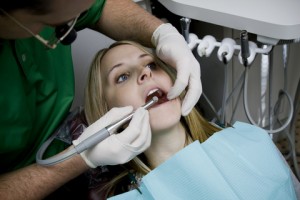 Your teeth play a very  important role in your life, and they are one of the most important parts of our body. Good dental health is important to your overall good health.
Your teeth play a very  important role in your life, and they are one of the most important parts of our body. Good dental health is important to your overall good health.
The most important part of life, which comes from having healthy teeth and gums, is the ability to enjoy different foods and tastes. Your teeth are essential to eating, and to enjoying various foods, and that is one very good reason why you must take good care of your teeth. If you find a problem with your teeth, you should not waste any time, and you should hurry to the dentist for proper treatment. A slight dental problem, left untreated, can become an enormous problem.
Every six months, you really should go to the dentist for check-ups, just  in case any cavities have developed, or any other dental problem which you may not be aware of. If you have professional teeth cleaning every six to eight months, there is much less chance of getting a cavity or other dental problems.
To maintain healthy and clean teeth, it is very important to thoroughly brush the surfaces of the teeth very carefully including the inside surfaces, as well as the front side and every inner part of your mouth. This should be done after every meal, but if you cannot do it after every meal, you should strive to do it before bed, and again when you awaken in the morning.
Always brush your teeth slowly and gently so you don’t hurt your gums. It is very important to keep your brush new and clean and replace your brush with a new one after two or three months. According to most dentists, one must brush the teeth, at least twice a day and before going to sleep.
If you find any wear showing on the bristles of your tooth brush, then you should immediately change your tooth brush. Flossing is also critically important for the health of your teeth. Flossing helps you to clean the surface of your teeth where the tooth brush may not reach. Most dentists say that a person must floss once a day and this will help you to keep your teeth healthy for a long time.
When using dental floss, you need to be careful and make sure it is long enough. To slide the floss in between your teeth, wrap the ends of the piece of floss tightly on your fingers. If the floss is tight, you will be able to clean the teeth more effectively. Be sure that you don’t use the floss more than once.
The doctors always recommend brushing your teeth after eating sugary food or rinsing your mouth with good mouth wash or warm water, rinsing is an alternative to brushing, when you’re unable to brush. Rinsing will help you get rid of some excess sugar from your mouth and can help you maintain a healthier mouth for your teeth.
After completing the brushing and flossing process, you should rinse your teeth properly and also check them. It is a great idea to examine your teeth in the mirror and always keep an eye on your teeth.
If your teeth are shining, sparkling and looking clean then they will help you have a better smile, a better appearance, and they will help with your personal life, as well as your business life, especially when dealing face-to-face with other people!
In business situations, and in social situations, people will judge you by the way your mouth looks. If you have food stuck in your teeth, it could prevent you from getting a date, if you’re single, and can prevent you from getting a job, if you’re interviewing for one. Good dental health affects your life in many ways.
 While most of the world’s population only visits their dentist for problems or pain they are having, many are beginning to see the advantages of cosmetic dentistry. A person’s overall smile and tooth health may be incredibly good but they may not have the look or appeal of beautiful teeth. Healthy teeth do not always look as good as they could. So, many patients are choosing Dental Veneers Fairfield CT.
While most of the world’s population only visits their dentist for problems or pain they are having, many are beginning to see the advantages of cosmetic dentistry. A person’s overall smile and tooth health may be incredibly good but they may not have the look or appeal of beautiful teeth. Healthy teeth do not always look as good as they could. So, many patients are choosing Dental Veneers Fairfield CT. Parents of newborn babies have a lot to deal with, from diapers to doctor appointments. Worrying about taking your baby to a dentist doesn’t have to happen until after the baby gets his or her first tooth – but how soon after that?
Parents of newborn babies have a lot to deal with, from diapers to doctor appointments. Worrying about taking your baby to a dentist doesn’t have to happen until after the baby gets his or her first tooth – but how soon after that? Unfortunately, there is no getting past proper dental care by a specialist. However, what is not noticed by many is that a great deal of individuals suffer from anxiety and fear when visiting the dentist. What is usually a simple procedure for most people is regarded as a nightmare to others. Luckily, there are strategies that both the patient and the dentist can undertake to create a more relaxing environment to ease the patient’s fear and anxiety.
Unfortunately, there is no getting past proper dental care by a specialist. However, what is not noticed by many is that a great deal of individuals suffer from anxiety and fear when visiting the dentist. What is usually a simple procedure for most people is regarded as a nightmare to others. Luckily, there are strategies that both the patient and the dentist can undertake to create a more relaxing environment to ease the patient’s fear and anxiety. Good dental hygiene is important to keep teeth whole and healthy. The idea is to prevent dental caries. Caries is the disease that leads to tooth decay and cavities. That is simple enough to say, but what are caries, tooth decay, and cavities? What do they do to your teeth, and how are they prevented? Here is a look at what they are and how they are related.
Good dental hygiene is important to keep teeth whole and healthy. The idea is to prevent dental caries. Caries is the disease that leads to tooth decay and cavities. That is simple enough to say, but what are caries, tooth decay, and cavities? What do they do to your teeth, and how are they prevented? Here is a look at what they are and how they are related.